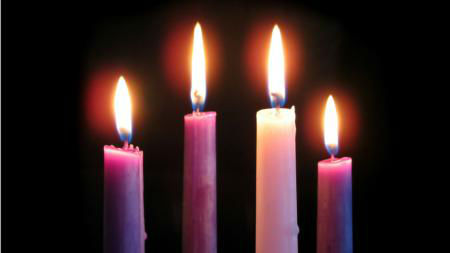So, how do you prepare?
There is so much noise and so many distractions in these December days that it causes me to wonder how one really can get prepared for Christmas. In the broader society, prepared means you have "all of your shopping done." Yet, the deeper truth is that preparing is actually something else entirely. It is an inner thing.
Last week, when I was speaking with the little children before their religious education classes about "getting ready" for Christmas, it was easy for them to list all the stuff one needs to do to get ready: put up a tree, decorate it, put lights in the window, get presents.... Then I introduced them to the idea that there are two kinds of preparing: inside and outside. It is the "inside" preparing that I think is the most important, and often times the most difficult.
The Scripture readings we are hearing at Masses these Advent days hold out two images. The first is the loveliness of God's promise, as depicted in the beautiful readings from the Prophet Isaiah: "The desert will exult ... bloom with abundant flowers -- the burning sands will become pools ..." The second image depicts John the Baptist urging people to repent and prepare for the coming of "One mightier than I." It seems that there is a connection between these two themes of a magnificent renewal of creation and an honest repentance of the heart.
When I think of repentance, I think of beating my breast and saying "I'm sorry." Yet this is not entirely accurate, for it is incomplete. I believe taking the time to reflect on my life and on my life style, and calling to mind my failings, sins and bad habits is only the first step in repenting.
The second is turning to God with sorrow that such choices have served to distance me from God. It is precisely for this consequence of sin, that I seek forgiveness. When the prophets speak about, "Making the crooked ways straight, raising up the valleys and lowering the mountains to make a pathway for God" it is precisely this inner "construction project" that they are referring to that needs to happen as a second part of repenting.
Thirdly, the act of repenting must lead us to be open to an abiding truth of the nature of God: God is love and we are the work of God's hands. God delights in us and seeks our response to that love. Repenting, therefore, is sorrow at turning away from God's love and a choice to return to receiving and living in that love. Often we get stuck on this last part. Our tendency is to focus on the human values of meriting and deserving love. Doing so effectively blocks us from the truth: nobody can earn God's love. It is a free gift. Such is the nature of God.
In Advent, we await the celebration of the greatest mystery since the creation of the world -- the Incarnation. God becomes human! And taking on our humanity, Christ initiates the salvation of the world. Born of Mary in a lowly shelter for work animals, first announced to poor shepherds in the nearby fields, the Savior of humankind calls the world to repentance, that is, to open ourselves unconditionally to the miracle of God's love.
FATHER JAMES RONAN IS PASTOR OF ST. MARY-ST. CATHERINE OF SIENA PARISH IN CHARLESTOWN.
- Father James Ronan is pastor of St. Mary-St. Catherine of Siena parish in Charlestown, Massachusetts



















